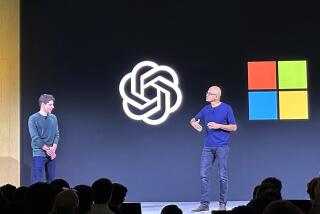Prime Computer Rejects MAI’s Offer, Says a Second Suitor Has Emerged
- Share via
Prime Computer on Tuesday rejected as inadequate a $20-a-share unsolicited takeover offer from Tustin-based MAI Basic Four and disclosed that it had received an inquiry from a third party about “a possible negotiated business combination.”
The disclosure of third-party interest raises the possibility that the Natick, Mass., computer maker might fend off MAI’s $970-million offer by agreeing to be acquired by another company on friendlier terms.
Prime did not identify the possible new suitor but said it received an “unsolicited preliminary inquiry” between Nov. 15 and Nov. 22. However, Prime said it is not actively engaged in negotiations for a merger, leveraged buyout or reorganization.
In a filing with the Securities and Exchange Commission, Prime also disclosed that it has entered into lucrative severance agreements, known as “golden parachutes,” with 23 executives. The company also implemented generous severance packages for most of its 12,000 employees worldwide. Company spokesmen acknowledged that the severance packages, which would make an unfriendly acquisition much more expensive to the buyer, are part of the company’s strategy for fighting the MAI bid.
New York financier Bennett S. LeBow, MAI’s controlling shareholder, vowed to continue “to pursue vigorously” the bid for Prime that was launched on Nov. 15.
“We are extremely disappointed that Prime Computer has rejected our fair and fully priced offer,” LeBow said. He accused Prime of attempting to “stonewall” the MAI offer by employing management-entrenchment devices such as “poison pills” and “golden parachutes.”
Prime’s decision to spurn MAI’s came as no surprise to analysts. Prime had already erected several other takeover defenses, and Prime management had told LeBow that they were not interested in a merger.
Prime said its directors voted unanimously to reject the MAI offer because the $20-a-share bid “does not reflect the intrinsic value of the company today or the long-term values achievable . . . over the next several years.”
David Dunn, Prime’s chairman, said in a statement that the board gave “careful consideration to a number of important factors” before deciding to recommend that Prime stockholders not tender their shares to MAI.
One of those factors was the heavy debt that MAI would incur if it succeeds in buying Prime. Dunn said Prime believes that “the highly leveraged transaction . . . would have a significantly adverse effect on the company’s relationships with its customers, employees, suppliers and other constituencies.”
LeBow, who is orchestrating the MAI bid, has argued that the case for a merger of the two computer makers is “compelling” and would make “excellent strategic sense.” But many securities analysts have taken a dim view of the deal, seeing little synergy between the two firms.
LeBow gave no indication Tuesday whether he would be willing to raise his offer for Prime. However, according to an SEC filing, LeBow told former Prime President Joe Henson during an exploratory discussion in October that MAI might consider raising its offer “in the context of a negotiated transaction.”
“I don’t think MAI will raise its offer at this point,” said Robert Johnson, a technology analyst with Rotan Mosle, a Houston investment firm. “I think they’ll wait to see if a white knight appears, and then they’ll make their move. They don’t need to make a preemptive strike here.”
Wall Street continued to take a skeptical attitude toward the MAI offer. In New York Stock Exchange trading, Prime’s stock closed Tuesday at $16.50, up 87.5 cents. Although Prime’s stock rose Tuesday on news of a possible new suitor, it has traded below MAI’s $20-a-share bid for several weeks.
Meanwhile, Prime has been moving to bolster its takeover defenses by adopting so-called shark repellent measures designed to make a takeover prohibitively expensive. The severance packages for management alone, could total $14.6 million.
Nineteen Prime executives will receive severance packages totaling about $7.7 million in the event they are terminated within 2 years of a change of ownership at the company. Prime said it reached a separate agreement with Anthony Craig, president and chief executive, in which he would receive $1.9 million if he resigns or is fired after a takeover.
Prime also said that four executives at its Computervision Corp. subsidiary, which Prime acquired in a hostile takeover last February, would receive severance packages totaling about $5 million in the event of a takeover.
Moreover, Prime said it has put into place “employee protection agreements” with most of its 12,000 employees worldwide. The agreements would guarantee employees 6 months of severance pay, plus an additional month of compensation for each year they worked if they are terminated within 2 years of a takeover.
More to Read
Inside the business of entertainment
The Wide Shot brings you news, analysis and insights on everything from streaming wars to production — and what it all means for the future.
You may occasionally receive promotional content from the Los Angeles Times.










